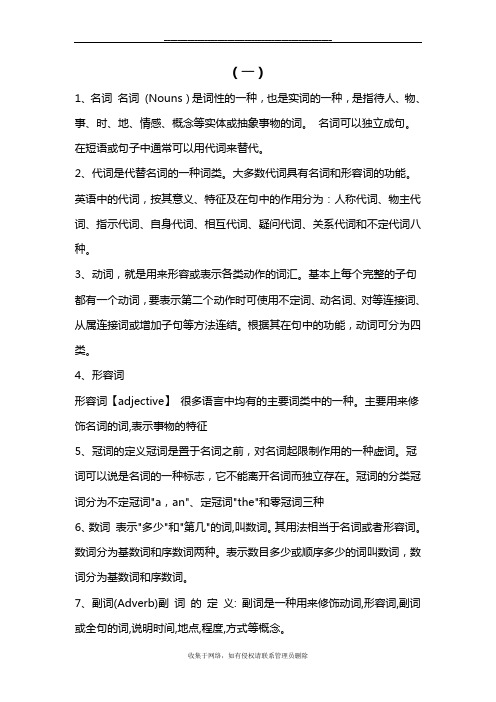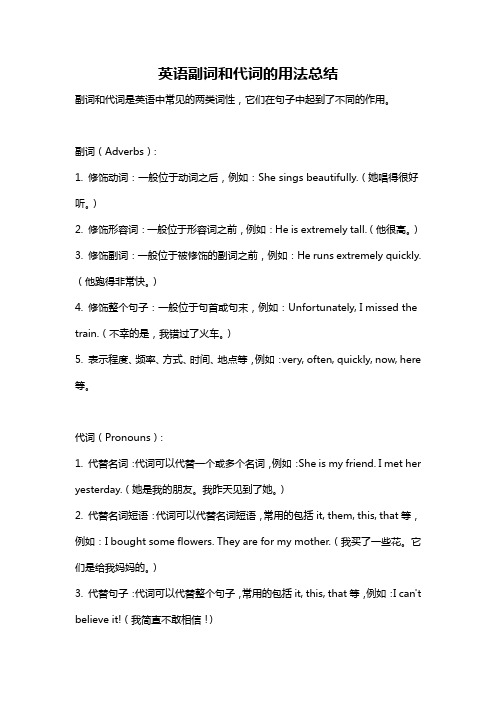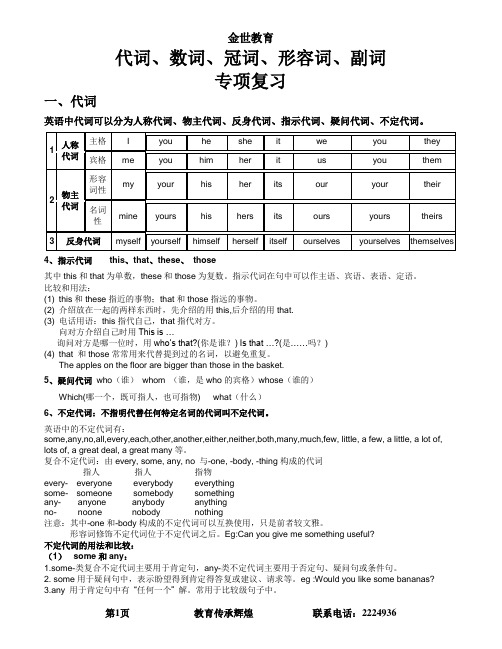英语(形容词,代词,副词)
英语文法基础:名词、动词、形容词、副词、介词、连词、代词的定义

英语文法基础:名词、动词、形容词、副词、介词、连词、代
词的定义
1. 名词:包括专有名词、普通名词和集合名词,需要注意可数名词与不可数名词,以及存在复数形式变化。
2. 动词:包括动词原形、过去式、过去分词和现在分词。
需要注意谓语动词的人称和数的变化,以及不规则动词的变化。
3. 形容词:常用的有级形容词、比较级形容词和最高级形容词。
需要注意其定义词语和搭配用法。
4. 副词:修饰动词、形容词或其他副词,常用来表达时间、程度、频率等。
需要注意副词的正确使用和搭配。
5. 介词:表示位置、方向和关系的词语,常见的有基本介词和固定短语介词。
需要注意其正确使用方法。
6. 连词:用于连接句子成分的词语,常见的有并列连词、因果连词和递进连词等。
需要注意其紧凑表达的特点。
7. 代词:用于替换名词和代替句子成分的词语,常见的有人称代词、物主代词和指示代词等。
需要注意其正确使用及变化形式。
另外,除了上述的词汇基础以外,还要注意句子的结构,加强语法的理解和运用,例如:
1. 动宾关系:主动词一般和及物动词相搭配,主表结构中的主语一般跟谓语动词构成谓语,而被动词则需要搭配助动词be。
2. 时态:掌握各个时态的正确使用和选择,并能熟练运用它们。
3. 从句:包括主语从句、宾语从句、表语从句和同位语从句等,需要注意语序和连接词的选择。
4. 语气:根据句子的不同结构,采用不同语气来表达,例如祈使句是用来做命令性指示的,因此要用肯定语气。
最新英语之中名词、代词、动词、形容词、冠词、数词、副词、介词、连词、感叹词

(一)1、名词名词(Nouns)是词性的一种,也是实词的一种,是指待人、物、事、时、地、情感、概念等实体或抽象事物的词。
名词可以独立成句。
在短语或句子中通常可以用代词来替代。
2、代词是代替名词的一种词类。
大多数代词具有名词和形容词的功能。
英语中的代词,按其意义、特征及在句中的作用分为:人称代词、物主代词、指示代词、自身代词、相互代词、疑问代词、关系代词和不定代词八种。
3、动词,就是用来形容或表示各类动作的词汇。
基本上每个完整的子句都有一个动词,要表示第二个动作时可使用不定词、动名词、对等连接词、从属连接词或增加子句等方法连结。
根据其在句中的功能,动词可分为四类。
4、形容词形容词【adjective】很多语言中均有的主要词类中的一种。
主要用来修饰名词的词,表示事物的特征5、冠词的定义冠词是置于名词之前,对名词起限制作用的一种虚词。
冠词可以说是名词的一种标志,它不能离开名词而独立存在。
冠词的分类冠词分为不定冠词"a,an"、定冠词"the"和零冠词三种6、数词表示"多少"和"第几"的词,叫数词。
其用法相当于名词或者形容词。
数词分为基数词和序数词两种。
表示数目多少或顺序多少的词叫数词,数词分为基数词和序数词。
7、副词(Adverb)副词的定义: 副词是一种用来修饰动词,形容词,副词或全句的词,说明时间,地点,程度,方式等概念。
8、介词的定义和特征介词是一种用来表示词与词, 词与句之间的关系的词。
在句中不能单独作句字成分。
介词后面一般有名词代词或相当于名词的其他词类,短语或从句作它的宾语。
(二)1、名词,人或事物的名称3、代词,代替名词或者数词(比如some就是代替数目)3、动词,动作或状态4、数词,表示数目或顺序(比如序数词,5th就是表示顺序)5、形容词,人或事物的性质或状态(因为形容词一般修饰名词)6、副词,动作的特征或性状特征(因为副词一般修饰动词或形容词)7、冠词,表示名词的泛指或特指8、介词,表示名词或代词与其他词的关系(因为介词后面一半紧跟名词,代词或其他名词性结构)9、连词,连接词与词,短语与短语,句子与句子10、感叹词,表示说话时的感情或语气(三)1、adj. / a. 形容词用来描述一类物质的性质,状态,外貌,或人的性格特点,性质,品格如:big,happy2、adv. / ad. 副词用来修饰动作或形容词,一般在句子中做状语用表示动作的进行怎样,或表示程度,特点,如:clearly,happily3、prep. 介词连接地点,时间的一类词语,可以表示方位,时间.跟一些表示时间,地点的词连用表示介词词组如:in,to,on,under4、conj. 连词用来连接时间,地点,原因,结果的一类词语如:when,beacuse,so5、num. 数词表示数字的词,既可以是基数词,也可以是序数词如:one,two,first6、int. 感叹词表示感叹的一类词,一般不加一解释,只代表感叹如:what,how,haurray7、vt. 及物动词(后面要加宾语)行为动作的词如:do,finish,play8、vi. 不及物动词(后面不加宾语)表示行为动作的词如:appear9、n. 名词表示物体,物质的词如:pig,cow,man10、pron. 代词代指一类人,事或物的词如:he,she,hers,his,things11、art = 冠词,article的缩写(四)在英语语法中主要把词分为8大类:1.名词:表示人、物或地方等,如:John,teacher;table,pen;London;beauty.2.代词:用来代替名词,以避免重复某个名词,如:I,you,it,that,those,them.3.形容词:用来修饰或限制某个(些)名词,如:good(man),white (paper),every(book),much(water),(John is)hon-est,(He seems)lazy.被修饰或限制的名词,叫做主体词(head-word)。
英语副词和代词的用法

英语副词和代词的用法副词(Adverb)是用来修饰动词、形容词、副词或整个句子的词,表示时间、地点、程度、方式等不同的概念。
常见的副词有:- 时间副词:often(经常)、sometimes(有时候)、never(从不)等。
- 地点副词:here(这里)、there(那里)、inside(里面)等。
- 程度副词:very(非常)、extremely(极其)、quite(相当)等。
- 方式副词:carefully(小心地)、quickly(快速地)、happily(快乐地)等。
副词的位置:- 修饰动词时,通常位于动词之前,例如:She sings beautifully.(她唱得很动听。
)- 修饰形容词时,位于形容词之前,例如:He is extremely tall.(他非常高。
)- 修饰副词时,位于副词之前,例如:She speaks English very fluently.(她英语讲得非常流利。
)- 修饰整个句子时,位于句首或句尾,例如:Hopefully, it will stop raining soon.(希望很快就停下下雨。
)代词(Pronoun)是用来替代名词的词,用来引用或代指某个人或物。
常见的代词有:- 人称代词:I(我)、you(你)、he(他)、she(她)、it(它)、we(我们)、they(他们/她们)等。
- 物主代词:mine(我的)、yours(你的)、his(他的)、hers(她的)、its(它的)、ours(我们的)、theirs(他们的/她们的)等。
- 指示代词:this(这个)、that(那个)、these(这些)、those(那些)等。
- 反身代词:myself(我自己)、yourself(你自己)、himself(他自己)、herself (她自己)、itself(它自己)、ourselves(我们自己)、yourselves(你们自己)、themselves(他们自己/她们自己)等。
英语的词的分类

英语的词的分类
1. 名词:名词是表示人、事物、地点或者抽象概念的名称的词。
例如:cat, car, China, happiness。
2. 动词:动词是表示动作或者状态的词。
例如:run, write, exist。
3. 形容词:形容词是用来描述名词或者代词特征的词。
例如:big, beautiful, happy。
4. 副词:副词是用来修饰动词、形容词或者其他副词的词。
例如:very, slowly, incredibly。
5. 代词:代词是用来代替名词或者名词短语的词。
例如:I, you, he, she, it。
6. 介词:介词是用来表示名词或代词与句子其他部分之间关系的词。
例如:in, on, under。
7. 连词:连词是用来连接两个或多个词、短语或者从句的词。
例如:and, or, but。
8. 冠词:冠词是用来限制名词的词,表明名词所指的范围或者数量。
例如:a, an, the。
9. 感叹词:感叹词是用来表示强烈的感情或者引起注意的词。
例如:oh, ah, well。
10. 数词:数词是用来表示数量或者顺序的词。
例如:one, two, three; first, second, third。
英语副词和代词的用法总结

英语副词和代词的用法总结副词和代词是英语中常见的两类词性,它们在句子中起到了不同的作用。
副词(Adverbs):1. 修饰动词:一般位于动词之后,例如:She sings beautifully.(她唱得很好听。
)2. 修饰形容词:一般位于形容词之前,例如:He is extremely tall.(他很高。
)3. 修饰副词:一般位于被修饰的副词之前,例如:He runs extremely quickly.(他跑得非常快。
)4. 修饰整个句子:一般位于句首或句末,例如:Unfortunately, I missed the train.(不幸的是,我错过了火车。
)5. 表示程度、频率、方式、时间、地点等,例如:very, often, quickly, now, here 等。
代词(Pronouns):1. 代替名词:代词可以代替一个或多个名词,例如:She is my friend. I met her yesterday.(她是我的朋友。
我昨天见到了她。
)2. 代替名词短语:代词可以代替名词短语,常用的包括it, them, this, that等,例如:I bought some flowers. They are for my mother.(我买了一些花。
它们是给我妈妈的。
)3. 代替句子:代词可以代替整个句子,常用的包括it, this, that等,例如:I can't believe it!(我简直不敢相信!)4. 作为强调词:代词可以用于强调某个成分,通常放在句首,例如:It was him who broke the window.(是他打破了窗户。
)5. 其他特殊用法:包括反身代词(myself, himself等)和相对代词(who, whom, whose, which等)等。
总之,副词用于修饰动词、形容词、副词和整个句子,代词用于代替名词、名词短语和句子。
它们在英语中起到了丰富句子含义和减少重复的作用。
英语代词、数词、形容词、副词的相关知识

第三节代词代词是为了避免重复而用来代替名词的词。
英语代词共有9种:人称、物主、反身、相互、指示、疑问、关系、连接和不定代词。
大多数代词具有名词和形容词的作用。
人称代词人称代词有人称、性、数、格之分。
人称代词在句中的排列顺序一般是:you 在最前,I we 在最后,如: you he and I。
人称代词的主格在句中作主语:They are playing football on the playground. 人称代词的宾格在句中作动词或介词的宾语:Our English teacher taught us an English song. His parents are looking for him. 要注意人称代词 it 的特殊用法:Look at that poor little child. It has just fallen down. It is necessary to buy that dictionary. I consider it important to ask him for advice. It is five o’clock. It is fine today. It was a bicycle that Ireceived yesterday.物主代词表示所有关系的代词叫物主代词。
物主代词可分为形容词性(一般作定语)和名词性(作主语、表语、宾语)物主代词两大类。
物主代词的各种形式如下表:人称名词性单数复数形容词性单数复数第一人称mine ours my our 第二人称yours yours your your阳性第三人称阴性his theirshers theirs his their her their形容词性物主代词除作定语外,还可放在动名词短语之前,作短语的逻辑主语。
如:Do you mind my opening the door? His coming made us very happy. We can’t believe her breaking the law. 反身代词表示“我自己”、“你自己”、“他自己”、“我们自己”、“你们自己”、“他们自己”的代词叫反身代词。
代词、数词、冠词、形容词、副词

代词、数词、冠词、形容词、副词专项复习一、代词英语中代词可以分为人称代词、物主代词、反身代词、指示代词、疑问代词、不定代词。
1 人称代词主格I you he she it we you they 宾格me you him her it us you them2 物主代词形容词性my your his her its our your their名词性mine yours his hers its ours yours theirs3 反身代词myself yourself himself herself itself ourselves yourselves themselves4、指示代词this、that、these、those其中this和that为单数,these和those为复数。
指示代词在句中可以作主语、宾语、表语、定语。
比较和用法:(1) this和these指近的事物;that和those指远的事物。
(2) 介绍放在一起的两样东西时,先介绍的用this,后介绍的用that.(3) 电话用语:this指代自己,that指代对方。
向对方介绍自己时用This is …询问对方是哪一位时,用who’s that?(你是谁?) Is that …?(是……吗?)(4) that 和those常常用来代替提到过的名词,以避免重复。
The apples on the floor are bigger than those in the basket.5、疑问代词who(谁)whom (谁,是who的宾格)whose(谁的)Which(哪一个,既可指人,也可指物) what(什么)6、不定代词:不指明代替任何特定名词的代词叫不定代词。
英语中的不定代词有:some,any,no,all,every,each,other,another,either,neither,both,many,much,few, little, a few, a little, a lot of, lots of, a great deal, a great many等。
英语之中名词、代词、动词、形容词、冠词、数词、副词、介词、连词、感叹词

(一)之袁州冬雪创作1、名词名词 (Nouns)是词性的一种,也是实词的一种,是指待人、物、事、时、地、情感、概念等实体或抽象事物的词. 名词可以独立成句.在短语或句子中通常可以用代词来替代.2、代词是代替名词的一种词类.大多数代词具有名词和形容词的功能.英语中的代词,按其意义、特征及在句中的作用分为:人称代词、物主代词、指示代词、自身代词、相互代词、疑问代词、关系代词和不定代词八种.3、动词,就是用来形容或暗示各类动作的词汇.基本上每一个完整的子句都有一个动词,要暗示第二个动作时可以使用不定词、动名词、对等毗连词、从属毗连词或增加子句等方法保持.根据其在句中的功能,动词可分为四类.4、形容词形容词【adjective】很多语言中均有的主要词类中的一种.主要用来修饰名词的词,暗示事物的特征5、冠词的定义冠词是置于名词之前,对名词起限制作用的一种虚词.冠词可以说是名词的一种标记,它不克不及分开名词而独立存在.冠词的分类冠词分为不定冠词"a,an"、定冠词"the"和零冠词三种6、数词暗示"多少"和"第几"的词,叫数词.其用法相当于名词或者形容词.数词分为基数词和序数词两种.暗示数目多少或顺序多少的词叫数词,数词分为基数词和序数词.7、副词(Adverb)副词的定义: 副词是一种用来修饰动词,形容词,副词或全句的词,说明时间,地点,程度,方式等概念.8、介词的定义和特征介词是一种用来暗示词与词, 词与句之间的关系的词.在句中不克不及单独作句字成分.介词后面一般有名词代词或相当于名词的其他词类,短语或从句作它的宾语.(二)1、名词,人或事物的称号3、代词,代替名词或者数词(比方some就是代替数目)3、动词,动作或状态4、数词,暗示数目或顺序(比方序数词,5th就是暗示顺序)5、形容词,人或事物的性质或状态(因为形容词一般修饰名词)6、副词,动作的特征或性状特征(因为副词一般修饰动词或形容词)7、冠词,暗示名词的泛指或特指8、介词,暗示名词或代词与其他词的关系(因为介词后面一半紧跟名词,代词或其他名词性布局)9、连词,毗连词与词,短语与短语,句子与句子10、感叹词,暗示说话时的感情或语气(三)1、adj. / a. 形容词用来描绘一类物质的性质,状态,外貌,或人的性格特点,性质,品格如:big,happy2、adv. / ad. 副词用来修饰动作或形容词,一般在句子中做状语用暗示动作的停止怎样,或暗示程度,特点,如:clearly,happily3、prep. 介词毗连地点,时间的一类词语,可以暗示方位,时间.跟一些暗示时间,地点的词连用暗示介词词组如:in,to,on,under4、conj. 连词用来毗连时间,地点,原因,成果的一类词语如:when,beacuse,so5、num. 数词暗示数字的词,既可以是基数词,也可以是序数词如:one,two,first6、int. 感叹词暗示感叹的一类词,一般不加一诠释,只代表感叹如:what,how,haurray7、vt. 及物动词(后面要加宾语)行为动作的词如:do,finish,play8、vi. 不及物动词(后面不加宾语)暗示行为动作的词如:appear9、n. 名词暗示物体,物质的词如:pig,cow,man10、pron. 代词代指一类人,事或物的词如:he,she,hers,his,things11、art = 冠词,article的缩写(四)在英语语法中主要把词分为8大类:1.名词:暗示人、物或地方等,如:John,teacher;table,pen;London;beauty.2.代词:用来代替名词,以防止重复某个名词,如:I,you,it,that,those,them.3.形容词:用来修饰或限制某个(些)名词,如:good(man),white(paper),every(book),much(water),(John is)hon-est,(He seems)lazy.被修饰或限制的名词,叫做主体词(head-word).4.动词:暗示行为或状态,如:speak,read,go,think,is,seem.5.介词:暗示它后面的名词(或代词)跟它前面的动词、另外一名词或形容词的关系.这些名词(或代词)称为介词的宾语.介词宾语和介词构成介词短语.He went to school.(介词to把名词school和动词went接洽起来)He stood by me.He asked for it.The book on the desk is mine.(介词on把名词book和另外一名词desk接洽起来)He lives in a house on the mountain.他住在山上的一幢房子里.The bridge across this river is built by a Frenchman.河上的桥是一位法国人修建的.He is sure of it.他对此很有掌控.(of接洽it和sure.)It is good for you.这对你有好处.He is angry with Mary.他生玛丽的气.6.副词:修饰或限制动词、形容词或其他副词,甚至介词、连词及整个句子.He walked slowly.他走得很慢.He did it carefully.他干得很仔细.He is a very kind man.他是一个非常善良的人.John is truly honest.约翰的确很诚实.He arrived too late.他到得太晚了.He walked rather slowly.他走得相当慢.He sat far behind me.他坐在我后面挺远的地方.He arrived exactly at seven.他在7点整到达.He will come probably after we take lunch.他能够在我们吃午饭之后到达.He loves her just because she is pretty.他爱她只是因为她漂亮.Luckily,he got back his money.幸好他把钱要回来了. Historically,China is a great nation.从汗青上看中国是个伟大的国家.7.连词:用来毗连词、词组(短语)或句子,如:and,but,or,so;或把一个句子和一动词或名词接洽起来,如:when,because,as,though,that.(连词and把Hong Kong He visited Hong Kong and Singapore.和Singapore毗连起来)他访问了香港和新加坡.She is pretty but cruel.她很漂亮却很残暴.He does exercise in class or at home.他在讲堂上或是在家里做操练.(or把in class和at home两个短语毗连起来)She sat by me,reading novels but turning her eyes tochildren about her from time to time.她坐在我身旁看小说,但不时把眼睛转向她周围的孩子们.He works hard,so he will succeed.他很尽力,所以他会成功.(so把he works hard和he will succeed毗连起来)He says this and that,but he does not mean them.他说这说那,但这些都不是他的真心话.He was writing when it was rainning.下雨时他正在写作.(when把动词was raining和he was writing毗连起来)He became a beggar because he had been a gambler.他成了乞丐因为他爱赌博.He went to school though he was sick.他虽病了,但他仍然上学.The news that the enemy had surrendered soon reached us.不久传来了敌人投降的消息.8.感叹词:用来暗示说话时的感情,如Oh!,Alas!,My!上面只是对8大词类粗略的诠释.别的冠词、数词也可算作两个词类,冠词只有a,an,the3个字,数词可归入形容词中.。
- 1、下载文档前请自行甄别文档内容的完整性,平台不提供额外的编辑、内容补充、找答案等附加服务。
- 2、"仅部分预览"的文档,不可在线预览部分如存在完整性等问题,可反馈申请退款(可完整预览的文档不适用该条件!)。
- 3、如文档侵犯您的权益,请联系客服反馈,我们会尽快为您处理(人工客服工作时间:9:00-18:30)。
第6讲形容词/副词形容词用来修饰名词或代词,表示人或事物的性质、状态和特征。
它的位置通常放在被修饰的名词前,也可以放在be动词和look、feel、taste、sound、get之后。
在英语中,形容词有三个等级,即原级、比较级和最高级。
1、表示两者“等同”时用原级,结构为:as+原级+as,表示“xx和xx一样……”e.g. Are you as tall as your twin sister?其否定形式结构为:not+as+原级+as,表示“xx和xxx不一样……”e.g. I‟m not as tall as you.2、表示两者“比较”时用比较级,结构为:比较级+than,表示“xx比xxx 更……” e.g. He‟s one year younger than me.形容词比较级的构成规则:①一般在词尾加ere.g. taller,longer,stronger,younger②以字母e结尾,只加re.g. late-later,nice-nicer③以辅音字母+y结尾,变y为i,再加ere.g. heavy-heavier④以一个元音加辅音结尾的重读闭音节结尾,双写末尾的辅音字母,再加ere.g. fat-fatter,thin-thinner,big-bigger⑤双音节和多音节词的比较级,在原级前加moree.g. more beautiful,more careful⑥不规则变化e.g. good-better,many / much-more,far-farther,bad / ill-worse3、三个或三个以上的人或物进行比较,用形容词最高级。
结构为:the + 形容词最高级+in/of等表示范围的短语,表示“最……”。
e.g. Autumn is the best season in New York.She is the tallest girl of our three.第7讲介词介词又叫前置词,是一种用来表示词与词、词与句之间关系的词,它一般放在名词、代词(宾格)或动词(动词ing形式)前面。
1、in①在……里面。
如:in the classroom② in+颜色,穿着……颜色的衣服。
如:Who‟s the man in white?③ in+语言,用某种语言说。
如:What‟s this in English?④在上午、下午、晚上。
如:in the morning,in the afternoon,in the evening⑤在年、月、季节前。
如:in 2008,in August,in summer⑥在国家、城市和较大的地方前。
如:in China,in Wuxi,in the playground⑦固定搭配。
如:in the middle of(在……中间),do well in(擅长),in the day (在白天),take part in(参加),stay in bed(躺在床上),in the street(在街上)2、on①在……上面。
如:on the desk②用在某一天(上、下午)前。
如:on the 5th of May,on Sunday,on Monday morning③以Day结尾的节日前。
如: on Children‟s Day,on New Year‟s Day④固定搭配。
如:on foot(步行),on duty(值日),put on(穿上),get on(上车) turn on(打开),on the right / left(在右边/左边),on the wall (在墙上),on Zhongshan Road(在中山路上)注意:树上长的水果用on the tree;不是树上长的外来物用in the tree。
如:I can see a lot of apples on the tree. There is a boy in the tree.3、at①在某个时刻前。
如:at seven o‟clock②在传统节日前。
如:at Spring Festival,at Mid-Autumn Festival,at Christmas ③在较小的地点。
如:at the bus stop④固定搭配。
如:at once(立刻,马上),be good at(擅长……),look at(看),at home(在家),at school(在学校), at weekends(在周末), at the back of(在……后部), at night(在夜晚)4、under在……下面如:There is a cat under the table.5、behind 在……后面如:There is an umbrella behind the door.6、near 靠近……如:There is a park near my house.7、beside在……旁边如:The students are standing beside the teacher.8、next to 紧靠……旁边如:The teachers‟ office is next to our classroom.9、before(时间上)在……之前如: before class(上课前)10、after (时间上)在……之后;依照固定搭配: after class(课后),after school(放学后),look after(照看),run after (追赶),read after me(跟我读)11、between 在两者之间如:There are some trees between Building A and Building B.12、by 乘某种交通工具如:by bus,by plane,by the way(顺便说一下)13、from①be from = come from(来自……)如:Mr Smiths is/comes from Australia.②from…to…(从……到……)We go to school from Monday to Friday.14、to 到、去……如:Let‟s go to the zoo. 固定搭配:write to(给xx写信)15、about 关于;大约如: I want to buy a book about animals. It‟s about one kilometer away.16、for为、给……如:Here‟s a letter for you. What‟s for breakfast?固定搭配:look for (寻找),wait for(等候)17、with①与……一起。
如:I‟ll go shopping with my mother.②具有某种特征。
如:Who‟s the boy with big eyes?③help... with... 在某方面帮助某人如: Can you help me with my English?④play with... 和……一起玩;拿……玩如:play with me,play with a yo-yo18、in front of在……前面如:There is a tree in front of the classroom.in the front of 在……前部如:There is a blackboard in the front of the classroom.19、along 沿着,顺着如:Go along this street.20、as 作为如:What would you like as a birthday present?21、out of 从……出来;往……之外如:The dog is running out of the house.22、of ……的,属于……如:a map of China ,a map of the world23、off 离开,在……之外如:keep off the grass(勿踏草坪),get off(下车)24、up向上如:stand up(起立),pull up carrots(拔胡萝卜)25、down向下如:sit down(坐下), jump up and down(上下跳)一、选择1.It is _____ today than yesterday.A. hotB. more hotC. hotterD. much hot2. This line is ____ than that one.A. not longerB. more longerC. much more longerD. many more longer3. Of the five toys, the child chose_____.A. the expensive oneB. one most expensiveC. a least expensiveD. the most expensive one4. Which do you like _____, coffee, tea or milk?A. the bestB. betterC. the betterD. best5.Mr Zhou, all of the students in our group, who lives ____? ---I think Li Lei does.A. fatB. fatherC. farthestD. farest6.The Changjiang River is ____ than any other river in China.A. shorterB. longerC. shortestD. longest7.Bob never dose his homework ____ Mary. He makes lots of mistakes.A. so carefulB. as carefully asC. carefully asD. as careful as8. They bet to see who could run _____ in the sports meeting.A. the fastestB. the fasterC. fastestD. faster9. This book is ____ of all.A. thinnerB. the thinnerC. more thinnerD. the thinnest10. She looks _____ than she really is.A. the more youngerB. much youngerC. very youngerD. more younger11. Our country is becoming ______.A. more beautiful and moreB. more beautiful and beautifulC. more and more beautifulD. more beautiful and beautifuler二、根据句意填入单词的正确形式:1. My brother is two years ____(old)than me.2.Is your sister ____(young) than you? Yes, she is.3.Who is ____(thin),you or Helen? Helen is.4.Whose pencil-box is ___(big),yours or hers? Hers is.5.Ben ___(jump) ___ (high) than some of the boys in his class.6.My eyes are ___(big) than___ (she).7.Which is ___(heavy), the elephant or the pig?8.Tom is as ___(fat) as Jim.9.Is Mary's hair as ____(long) as Lucy's?10.Fangfang is not as___(tall) as the other girls.11.The child doesn't___(write) as __(fast) as the students.12.Mr. Smith is _________ man in this office. (rich)13.Winter is _________ season of the years. (cold)14.It is much _______ today than yesterday. (hot)15. She is a little ________ than her classmates. (careful)16. Which book is ________, this one or that one? (easy)17.My room is _______ than yours. (small)18.Skating is _______ than swimming. (exciting)19. Things are getting _______ and _______. (bad)20. The higher you climb, the _______ it will be. (cold)21. Bob is _________ ( young ) than Fred but ___________ (tall) than Fred.22.Yingtian is not as ___________ (tall) as Yongxian.23.Which is _________ (heavy), a hen or a chicken?24. Her mother is getting ____________(fat) and ________ (fat).25. Most of the students think a lion is much ________(dangerous) than a bear and it is the __________ (dangerous) animal in the world.介词练习1.Please look the blackboard. Don’t listen the teacher.2.I can see a kite the wall.Is Han Meimei duty today?3.The woman the coat is Mrs Brown.This is a picture our school.4.Can you sing this song Japanese? The boy the green bike is Tom.5.The apples are the tree. Now Tom is the tree.6.Please give the books Jim. It’s seven twenty.7.It’s time go school.8.I watch TV eight the morning. Put it , please. Don’t take it .9.Is this a doctor a teacher?10. My father usually goes to work ________ 8:00.11.We never go shopping ______ the evening.12.I get up at 7:30 _______ the morning.13.Christmas is __________ December 25th.14.What is the first lesson________ Tuesday?15. Mr. Web will go to Shanghai ______ Oct. 22nd。
